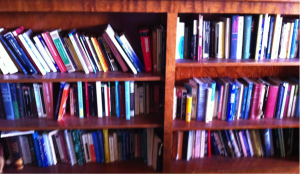 Now that the semester is well underway, I thought it would be a good time to talk about the classes that I’m taking this semester. I’ll start by discussing the seminar-style classes at the University of Puget Sound, because they use a great system of teaching that is is unique to liberal arts schools.
Now that the semester is well underway, I thought it would be a good time to talk about the classes that I’m taking this semester. I’ll start by discussing the seminar-style classes at the University of Puget Sound, because they use a great system of teaching that is is unique to liberal arts schools.
I took my first seminar-style class last semester with my Honors Writing and Rhetoric class studying New World Rhetoric. The class looked at the rhetoric surrounding the discovery of new peoples and travel from the middle ages through the Early Modern Period.
Seminar classes are about fifteen students total. Our class was around a long table and classes were almost entirely centered around discussion (when we weren’t involved in discussion, we were pre-writing or crafting ideas for discussion!). I love the guided discussion approach to learning because it is entirely interactive. At the same time, because it is a guided discussion, classes end up covering the texts we’re reading and their associated history in detail. Class feels like a collaborative meeting instead of a one-way lecture, and I find that I personally retain more information and develop stronger paper ideas in discussion than in lecture alone. Discussion-based classes also act as constant preparation for developing and presenting ideas, two key elements of writing (a major part of college classes) that are rarely addressed in lecture-based classes.
But you don’t have to take my word for it: here’s a great NPR article about a study by physicists on why lectures don’t work, and what to do instead:
http://www.npr.org/2012/01/01/144550920/physicists-seek-to-lose-the-lecture-as-teaching-tool
It essentially advocates for collaborative learning, small-group discussion, and student-professor feedback, three qualities that major parts of seminar classes and that are ubiquitous in classes at Puget Sound. In fact, Puget Sound and other liberal arts schools have long used the teaching style for which this article advocates, so it’s fascinating that the liberal arts approach to education is finally receiving official verification!
Even though not all of my classes are officially seminar-based classes, they all incorporate the seminar teaching style thoroughly. My Early British Literature class this semester is almost entirely discussion. We spend most classes discussing specific passages in detail, closely reading texts such as Beowulf, Paradise Lost, Beowulf, The Duchess of Malfi, and Shakespeare’s Sonnets. Prior to the University of Puget Sound, my exposure to British Literature mostly consisted of reading Charles Dickens and Shakespeare, but my professors have really brought Early British Literature to life and it’s now one of my favorite periods of English literature.
I am also taking a seminar class with the honors program called History and the Construction of the Other, which looks at seminal historical texts from Herodotus’s Histories of Ancient Greece to World War II texts. Although the scope of the class is fairly large and the class is fast-paced, we read a substantial amount of each text and devote most classes to discussion and short writing assignments to prepare for discussion. My professor spends a lot of time connecting past historical events to current ideas an issues. For example, we discussed how the Founding Fathers were inspired by Livy’s Early History of Rome, just last class when we discussed the Republic’s political system and Code of Laws.
I am also taking a class in Chemical Analysis and Equilibrium, essentially a hybrid second-semester chemistry class with some statistics and chemical analysis. My class is small for an introductory science class – about 30 people total – which is less than the size of my high school Chemistry class. Lab is even smaller and allows for a lot of small-group work.
The other class I’m taking is Intro to Computer Science. I had some experience programming a long time ago, but the class uses a different language than the one I used and emphasizes a different type of programming style than I used, which has made the class really useful and interesting. Although the class is a lecture, my professor essentially uses the Socratic Method, asking students how they would program certain methods or write certain lines of code. This makes the class extremely interactive, and classes rarely feel like a lecture.
That’s all the classes I’m taking this semester! I’ll post soon about performances for Fight Call and the other things I’m working on this semester.
